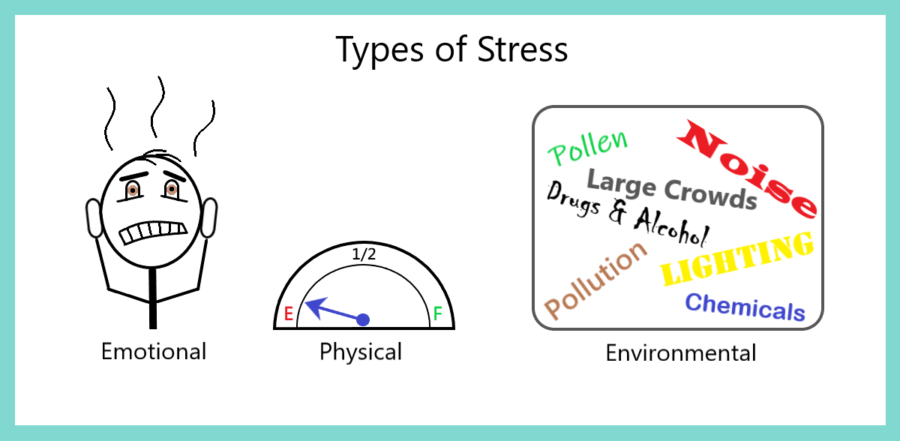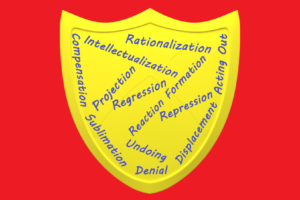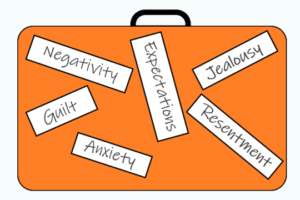Types of Stress –
Sometimes your behavior has more to do with your responses to your environment than you realize. This is not an excuse for your behavior, but more of an explanation. Traditionally when you think about stress, you probably think about emotional stress. Granted, emotional stress can be a huge influence in your life, but there are two other stressors in your life that are just as important: physical stress and chemical stress.
Just being aware that there are three different types of stress may help you control the environment you live in. It is about making choices on how you think about things (emotional stress), the way you do things (physical stress) and the things with which you surround yourself (chemical stress).
Emotional Stress
Emotional stress or psychological stress surrounds you. You worry about your relationships, your children, your job, money, the pandemic, politics, etc. The list goes on and on. Understanding more about the impact of some of these emotional stressors may help you gain control over them.
- ACEs
Adverse Childhood Experiences or ACEs are potentially traumatic events that occur in childhood (0-17 years) that are linked to chronic health problems, mental illness, and substance misuse in adulthood. ACEs can also negatively impact education and job opportunities.
Examples of traumatic events include:
• experiencing violence, abuse, or neglect
• witnessing violence in the home or community
• having a family member attempt or die by suicide
• instability due to parental separation or household members being in jail or prison
CDC Centers for Disease Control and Prevention – Preventing Adverse Childhood Experiences
- Holmes and Rahe Stress Scale
In 1967, psychiatrists Thomas Holmes and Richard Rahe surveyed more than 5,000 medical patients and asked them if they had experienced any of 43 life events in the previous two years. They wanted to determine the effect of stress on physical health.
Each event, called a Life Change Unit (LCU), had a different “weight” for stress. The more events the patient added up, the higher the score. The higher the score, the more likely the individual was to become physically ill.
Examples of LCU include:
• Death of a spouse 100
• Marital Separation 65
• Fired at work 47
• Change in social activities 18
MindTools – The Holmes and Rahe Stress Scale
Physical Stress
Physical stress is also known as mechanical stress. Physical stress includes all the things you do to your body that may result in physical stress. For many, physical stress can lead to emotional stress. Examples of physical stress include carrying heavy backpacks, repeated manual labor, how you sleep, ergonomics at your desk, and sitting with your legs crossed.
- Sleep
Almost everyone understands that sleep is fundamental to a good day, but it is less well known how critical it is to good physical health. You may lead a life that is so hectic that you sacrifice sleep, but that is an enormously bad decision.
Lack of sleep over an extended period of time has been linked to health risks:
• Elevated risk of heart disease
• Overeating and obesity
• Prone to injury or accidents
• Weakened immune system
Colorado Pain Care – How Your Sleep Posture Impacts Your Health
- Carrying Physical Weight
When you first get a backpack or purse, you put in just what you need. It’s perfectly filled and perfectly comfortable. But as time goes on, it tends to get packed with more and more stuff. Since the shift is gradual, you might not even realize it at first, but it can turn into a big problem.
Around 80% of adults experience lower back pain at some point in their lives, and lifting or carrying heavy items can contribute to this problem. And while it seems like the norm for kids to have a backpack brimming with textbooks and supplies, it’s not a good idea. Carrying a backpack weighing more than 10 percent of a child’s body weight is linked to back and neck pain.
Readers Digest – What Happens to Your Body When You Wear a Heavy Backpack Every Day
Chemical Stress
Chemical stress, a very broad category is also known as “environmental stress”. You may not realize all of your chemical input but many environmental factors are included.
These problems are detrimental to your health:
• Alcohol, drug and tobacco use
• Pollen, molds, and other allergens
• Cleaning agents and detergents in contact with your skin
• Poor lighting (not enough sunlight)
- Pollen Allergies
Pollen is one of the most common causes of allergies in the United States.
Pollen is a very fine powder produced by trees, flowers, grasses, and weeds to fertilize other plants of the same species. Many people have an adverse immune response when they breathe in pollen. In people with pollen allergies, the immune system mistakenly identifies the harmless pollen as a dangerous intruder. It begins to produce chemicals to fight against the pollen. This is known as an allergic reaction.
A pollen allergy may also be referred to as hay fever or allergic rhinitis. About 8 percent of adults in the United States experience hay fever, according to the American Academy of Allergy, Asthma, and Immunology (AAAAI). Once developed, allergies are unlikely to go away. However, symptoms can be treated with medications and allergy shots. Making certain lifestyle changes can also help relieve the symptoms associated with pollen allergies.
Healthline – Pollen Allergies
- GMOs
Genetically modified organisms or GMOs or bioengineered foods are plant or animal organisms or microorganisms whose DNA has been modified using genetic engineering technology. They have been altered in a way that does not occur naturally. Research has been mixed about the safety of this process.
In the food industry, GMO crops have had genes added to them for various reasons, such as improving their growth, nutritional content, sustainability, pest resistance, and ease of farming. It is difficult to identify genetically modified products as foods in your supermarket are made with ingredients from GMO crops. GMO crops comprise 90% of soy, cotton, and corn grown in the US. Currently in the US, there are no regulations mandating the labeling of GMO foods. However, as of January 2022, the USDA will require food manufacturers to label all foods containing GMO ingredients as “bioengineered food.”
Healthline – What are GMOs?
It is interesting to note that a number of EU (European Union) members have prohibited the use of GMOs or GM seeds. Countries banning foods containing GMOs include Austria, Hungary, France, Greece, Germany, and Luxembourg. Poland has enacted legislation that prohibits the marketing of all GM seeds.
Library of Congress – Restrictions on Genetically Modified Organisms: European Union
Summary
So next time you think about stress, think about all of the ways you can reduce stress. Maybe it is time to take an emotional stress inventory by assessing your ACEs score or understanding more about the Holmes & Rahe Stress Scale (emotional stress). Can you carry around fewer items in a purse or backpack, or improve your sleep hygiene (physical stress)? Can you eat foods without GMOs, or use more natural cleaning products (chemical stress)?
Knowledge is power!
For more detailed information about stress and how to manage stress, please read my book Crush Your Stress: 302 Coping Skills for Managing Your Stress
With warmest regards,
To be notified of new posts like Do You Know The 3 Types of Stress?, please enter your email address and click on the Subscribe button.











